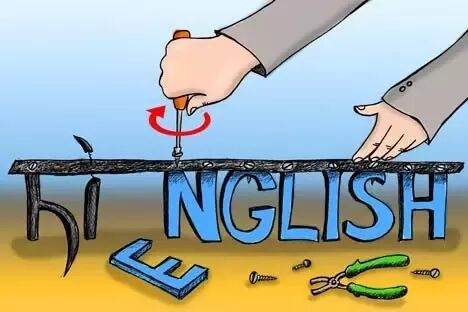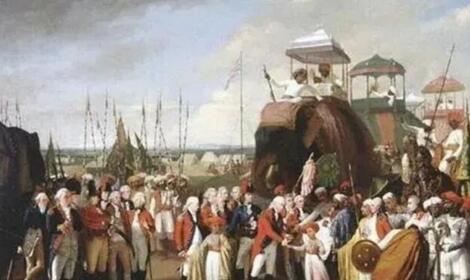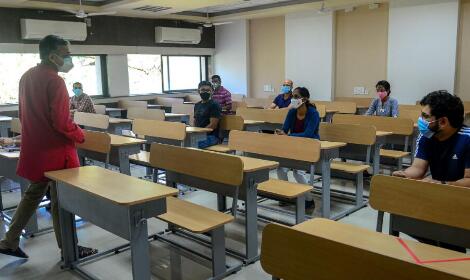QA问答:为什么许多印度人为喜欢英语多与母语而自豪?
正文翻译
Why do many Indians feel proud about preferring English over their mother tongues?
为什么许多印度人为喜欢英语多与母语而自豪?
为什么许多印度人为喜欢英语多与母语而自豪?
评论翻译
Balaji Viswanathan
I guess many Indians are quite proud of our mother tongues, but the question is still valid. A few years ago, I went to a HP service center in Chennai for fixing my tablet. Since I knew they know Tamil I asked them questions in Tamil, although the lady there gave replies in broken English, trying hard to appear educated.
Why do people feel proud to speak in English?
我想很多印度人都为我们的母语感到骄傲,但这个问题仍然是对的。
几年前,我去金奈的一家惠普服务中心修理平板电脑。
因为我知道他们懂泰米尔语,我用泰米尔语问了他们一些问题,那里的女士却用蹩脚的英语回答,努力表现出受过教育的样子。
为什么人们要为用英语说话而感到自豪?
1. Show that they are educated. In India, the ability to speak English is strongly correlated with college degrees and in general better education. Given that education is a premium asset in India, people try hard to speak in English when possible and show others that they make the cut.
2. Throughout the world, "educated" people often try to include words that the common folks don't use to draw a line between them. Thus, the English nobility of medi period started using French and Latin words to appear more refined compared to the boors. Same is the case of some pretentious Indians in cocktail parties.
1、表明他们受过教育。
在印度,说英语的能力与大学学位和普通高等教育密切相关。鉴于教育在印度是一项宝贵的资产,人们尽可能努力用英语说话,向其他人表明他们成功了。
2、在世界各地,“受过教育”的人,经常试图加入普通人不会用的词语,用来表明他们和普通人之间的界限。因此,在中世纪的英国,贵族会使用法语和拉丁语单词,这会让他们感觉自己比乡巴佬更精致。一些自命不凡的印度人在鸡尾酒会上也是如此。
3. Improper exposure to mother tongue. For many Indians, mother tongue is not used to express higher level ideas. Thus, while they could convey their emotions in their mother tongue, they might not be able to talk scientific ideas in their mother tongue. Thus, they would want to talk in English when they want to express their erudite opinions.
4. Some of us were forced to use English at school & home. In some of the schools I studied, we needed to pay a penalty of Rs.0.50 for every non-English word we used in the class. Quite a sick system if I think about it now. The school thought that their brand would go down if the society saw us speaking in those "dirty" native languages. We still used Tamil words when our Mam was not looking at us, and it was as though we were hiding as highway robbers. Fortunately for me, my parents always encouraged me to learn Tamil, Hindi and Sanskrit (I can speak in only the first two).
3、无法正确的使用母语表达。
对许多印度人来说,母语并不是用来表达更高层次的思想的。因此,虽然他们可以用母语表达自己的情感,但他们可能无法用母语谈论科学思想。因此,当他们想表达自己博学的观点时,他们会想用英语交谈。
4、我们中的一些人被迫在学校和家里使用英语。
在我学习过的一些学校,当我们在课堂上使用非英语单词的时候,一个单词需要支付0.50卢比的罚款。
我现在想想,这真的是一个相当病态的系统。
学校认为,如果社会看到我们用那些“肮脏”的母语说话,他们的品牌就会衰落。
当管理者不看我们的时候,我们仍然使用泰米尔语单词,就好像我们躲在高速公路上抢劫一样。
幸运的是,我的父母总是鼓励我学习泰米尔语、印地语和梵语(我只能说前两种)。

Rohit Murthy
We have a saying in India - "Angrez chale gaye, angrezi chhod gaye." In a satirical sense, it translates to "The British left India but left behind the English language".
Some excellent answers have already been given on this question. I'll elaborate a bit more on the reasons that they have mentioned from a historical point of view.
To begin with, how did the English language become a part of India's lingual landscape?
Stage 1: Dinos Arrive
我们印度有一句谚语:"Angrez chale gaye, angrezi chhod gaye."
从讽刺的意义上来说,它可以翻译成:“英国人离开了印度,但留下了英语”。
关于这个问题,有人已经给出了一些很好的答案。我将从历史的角度详细阐述他们提到的原因。
首先,英语是如何成为印度语言景观的一部分的?
第一阶段:恐龙抵达

The British came to India initially as traders and established a number of trading posts under the control of the East India Company. In due course of time, it became more powerful with its private armies and took military and administrative control of India. Towards the latter part of the 18th century the Company dissolved but the British Crown took over and took control of the divided world that was India. English as a language initially was taught informally mostly by Christian missionaries. However, once the British took control of India, it became the language of administration, law and the Government. The dinos had indeed arrived!
英国人最初以贸易商的身份来到印度,并在东印度公司的控制下建立了一些贸易站。经过一段时间,它的私人军队变得更加强大,并对印度进行了军事和行政控制。
18世纪后半叶,该公司解散,但英国王室接管并控制了分裂的印度世界。英语最初是一种非正式的语言,主要由基督教传教士教授。然而,当英国控制了印度,它就成为了行政、法律和政府的语言。恐龙真的来了!
Stage 2: 'Dinosaursim' Spreads
In the early part of the 19th century the English Education Act was passed which gave a huge impetus to the establishments of English medium schools and educational institutions teaching Western curriculum. Clerical posts in administrative and government offices started requiring exams taken in English and testing language ability. Now, Indians were forced to adopt this new language as a means of social advancement. The fact was that in this British controlled world, learning English and adopting their culture gave us the 3 things we craved for - wealth, power and position. A government job was not only a coveted job, but also came along with post-retirement pensions. Soon, a number of English-educated Indians started getting involved in the governing machinery and also played a pivotal role in guiding freedom movements across the country. English became the interface between the British and us. The 'Dinosaurism' had spread across the country.
第二阶段:“恐龙族群”扩张阶段
19世纪初,英国通过了《英语教育法》,极大地推动了以英语为媒介的学校,和教授西方课程的教育机构的建立。
行政和政府办公室的文员职位,开始要求参加英语考试和语言能力测试。
就这样,印度人被迫采用这种新语言作为社会进步的手段。
事实是,在这个英国控制的世界里,学习英语和接受他们的文化,给了我们渴望的三样东西——财富、权力和地位。
政府工作不仅是一份令人垂涎的工作,而且还伴随着退休后的养老金。
很快,一些受过英语教育的印度人,开始参与管理机制,并在指导全国各地的自由运动中发挥了关键作用。
英语成为了英国人和我们之间的交流界面。“恐龙族群”已经在全国蔓延。

Stage3: Dinos leave, Dinosaurism survives
When India gained independence in 1947, it was this educated class that filled up the positions left by the British. Attempts were then made to have an Indian language as the national language. But in a country with more than 30 languages and 1600 mother tongues, that really is a tough ask. Hindi was made the first official languages and attempts to make it the national language met with strong opposition from Tamil Nadu and other non-Hindi speaking states. Eventually, the English Language Amendment Bill was passed making English the "Associate language" of India alongside Hindi. It was to remain as an associate language until such time as all non-Hindi speaking states agree to it being dropped. However, that has never happened and English became indispensable in India. It had become the interface between the Hindi and non-Hindi speaking population. Later it also became our interface with the outside world, particularly the West. It became a means of inclusion of all under one umbrella.
第三阶段:恐龙离开,恐龙族群存活下来
1947年印度独立时,这些受过教育的阶层填补了英国留下的职位。
随后,人们试图将印度的语言作为国家语言。但在一个拥有30多种语言和1600多种母语的国家,这真的是一个艰难的要求。
印地语成为第一种官方语言,并试图将其作为国家语言,但遭到了泰米尔纳德邦和其他非印地语地区的强烈反对。
最终,《英语语言修正法案》获得通过,使英语与印地语一起成为印度的“联合语言”。
在所有非印地语地区同意放弃之前,就只能一直使用联合语言。然而,他们从未放弃,英语在印度变得不可或缺。
它已经成为印地语和非印地语人口之间的交流界面。后来,它也成为了我们与外部世界,特别是西方世界的接口。它成为一种将所有人纳入一个保护伞下的手段。
So what does all this have to do with your question?
Firstly, it's wrong to generalize that Indians prefer English over their native language or mother tongues. More likely, it depends on the environment and the people involved during communication. In businesses, jobs and education, English is used almost as an automatic choice of communication. But in an informal environment of native people, the native language becomes the automatic choice of communication.
Secondly, as both Balaji and Siddharth have mentioned, speaking in English is still a sign of education. In a country where education still remains a luxury, an English-bred education does improve your brand image.
Thirdly, we are a country where about 20% of our population speaks English and only about 4% speak it fluently. In a social setting trying hard to emulate the West, speaking in English can boost your social image and admit it, social image is as inherent in India as it can get. Possibly the human race.
那么,这一切与你的问题有什么关系呢?
首先,认为印度人更喜欢英语,而不是他们的母语,这是错误的。更有可能的是,这取决于沟通过程中所涉及的环境和人员。
在商业、工作和教育中,英语几乎是一种自动选择的交流方式。但在原住民的非正式环境中,母语成为交流的自动选择。
其次,正如 Balaji 和 Siddharth 提到的那样,用英语说话仍然是教育的标志。
在一个教育仍然是奢侈品的国家,英国教育确实能改善你的品牌形象。
第三,在我们国家,大约20%的人口会说英语,只有大约4%的人能流利地说英语。
在一个试图模仿西方的社会环境中,用英语说话可以提升你的社会形象,和人们对你的认可程度。在印度社会,尽己所能的提升社会形象是一种传统。可能人类社会皆如此。
Fourthly, as more and more MNCs have started entering India and with the corporate culture spreading rapidly, Indians, and working professionals in particular, have begun to accept English as a native language over their actual native languages. Migration of more and more people from their native towns and villages to the cosmopolitans has resulted in a gradual erosion of their native roots. Their exposure to English is more than their native languages/mother tongues and their succeeding generations are raised in an English-speaking environment.
Finally, We like to beat the English at their own game. Cricket anybody?
第四,随着越来越多的跨国公司开始进入印度,随着企业文化的迅速传播,印度人,尤其是在职专业人士,已经开始接受英语作为本族语言,而不是他们实际的母语。
越来越多的人,从他们的家乡城镇和村庄迁移到世界各地,导致他们的本土根基逐渐被侵蚀。他们接触英语的时间超过了他们接触母语的时间。他们的后代都是在讲英语的环境中长大的。
最后,我们喜欢在英国人的比赛中击败英国人。有人想来场板球吗?
Siddharth Bhattacharya
Why do people choose Armani? Not necessarily because it's more comfortable, but it means a higher social status & affording capability. British brought English to India, offering it only to the educational elite. Somehow tradition continued post-independence, English still comes at a high price. So when you listen to Indians speaking in English, mostly you can infer the speaker is rich (not poor) & educated. And some people love being branded.
Let's admit it - Bollywood sucks. Some people who discover this switch to English movies, just to find it better. Also English literature (including Indian Writing in English) is diverse and very good (not meaning Hindi isn't, but English is). People with more exposure to these are comfortable expressing themselves in English. So when discussing gossip, we switch to Hindi while on discussing issues dealt here, it's easier expressed the way we found it.
1、人们买衣服的时候为什么选择阿玛尼?因为它更舒适吗?不一定,只是因为这意味着更高的社会地位和负担能力。
英国人把英语带到了印度,只向教育精英提供英语。不知怎的,独立后的传统仍在延续,英语的价值仍然很高。因此,当你听印度人用英语说话时,你可以推断出说话者是富人(而不是穷人),受过教育。有些人喜欢被打上烙印。
2、让我们承认这一点,宝莱坞很糟糕。有些人发现了这一点,转而看英语电影,就是因为它更好。
此外,英语文学,包括印度人用英语写的,也是多样化的,非常好。不是说印地语不行,而是说英语好。接触这些内容的人更愿意用英语表达自己。因此,当讨论八卦时,我们会改用印地语,而讨论要处理的问题时,我们更喜欢用我们发现的方式表达。
Business language: As an emerging economy, India's comparative advantage remains its ability to speak English. We're an outsourcing hub today & MNC jobs pay more. Thus the demand for the language has increased, somehow becoming a necessary skill for jobs. This is a reason why Indians keep brushing up their fluency in English (ending up speaking faster than Brits)
Uniting language: Some Dravidian languages predate Hindi. They wanted their language to be the national language alongside Hindi but it simply didn't happen due to the percentage of native speakers. As a result, they weren't cool about Hindi being the only national language and English served as another national language to unite India. So yeah, when you listen to 2 Indians speaking in English, they may not share any other language!
To able to use Quora more often :) Only English is available as of now.
3、商务语言:
作为一个新兴经济体,印度的比较优势仍然是英语能力。我们现在是一个外包中心,跨国公司的工作报酬更高。因此,对语言的需求增加了,不知何故成为了工作的必要技能。这就是印度人不断提高英语流利度的原因(最终比英国人说得更快)。
4、统一语言:
一些德拉威语早于印地语。他们希望自己的语言与印地语一起成为国家语言,但由于母语人口的比例,这根本没有办法实现。
因此,他们对印地语是唯一的民族语言,而英语是另一种团结印度的民族语言感到不爽。
所以,是的,当你听两个印度人用英语说话时,可能就是因为他们没有其他的共同语言。
5、为了能够更频繁地使用QA,截至目前,只有英语可用。
Adityavikram Hirani
No we don't. Gist of the answers mentioned above is that we learn English as it is a necessity and also the fact is that we do not despise doing so. We like English but do not prefer English 'to' our mother tongues.
不,我们没有。上面提到的答案已经说过了,我们学习英语是必要的。事实上我们并不鄙视这样做。我们喜欢英语,但没有喜欢到超过母语的程度。
Surya Mandavilli
I think it is not pride, it is the lack of easy access to learn their mother tongue with great vocabulary and depth. My mother tongue is Telugu and till I was 19 I am not quite sure which is the best language I know. I have studied English as my second language and it was also my medium of instruction and study. Telugu was my first language and Hindi my third language which I only can read, write and understand. Since my childhood most of the people told us why are you even taught your mother tongue in school. Due to my dependent thinking then and my mind filled with regret wasting my time looking at books of telugu I totally lost interest in that language. So I couldn't take great interest in Telugu literature or language from my childhood but I have found that language is very essential in life
我认为,这不是骄傲,而是因为缺少轻松获得掌握大量和有深度的母语词汇的机会。
我的母语是泰卢固语,直到19岁,我都不太确定哪种语言,是我所知道的最好的语言。
我学习英语作为我的第二语言,英语也是我的教学和学习媒介。
泰卢固语是我的第一语言,印地语是我只能读、写和理解的第三语言。
从我小时候起,就有很多人不停的抱怨,为什么学校里还要教母语。
由于我当时受到的影响,我的脑海里充满了懊恼,还要浪费时间看泰卢固语的书,我完全对这种语言失去了兴趣。因此,我从小就对泰卢固语文学或语言不太感兴趣。但我发现语言在生活中非常重要。
So I started concentrating on my linguistic skills and I have easily mastered English and it took more time for me to master my mother tongue Telugu. The reasons for that are simple. First one is , to develop linguistic skills Newspapers are the best way. None of the leading telugu dailies have good telugu vocabulary. They merely use more english words to describe and editorials are also of very less telugu vocabulary. So I stopped reading them. Modern telugu literature is not very much developed, according to me, because of the less diversity in topics written and not adopting new words from other languages. English has adopted words from almost all languages and I feel I can best explain anything in English because of that ease. Telugu language words are mostly drawn from Sanskrit and poets of telugu language couldn't develop words itself. The books which are now published are also of few ranging topics. Other reasons are even if good telugu books are published they are not of science/politics/economics but are of literature only. The market for that books is so less, limited and shrinking. Even when I started reading books the first books I read were of my mother tongue and not English books.
所以我开始专注于我的语言技能,我很容易就掌握了英语,我花了更多的时间来掌握我的母语泰卢固语。
原因很简单。
首先,要发展语言技能,报纸是最好的方式。泰卢固语主流日报都没有很好的泰卢固语汇。他们只是用更多的英语单词来描述,而社论的泰卢固语词汇也很少。所以我不再读了。
据我所知,现代泰卢固语文学并没有得到很大发展,因为写作主题的多样性较低,也没有采用其他语言的新词。英语几乎采用了所有语言的单词,我觉得我能用英语解释任何事情,因为它很容易。
泰卢固语的单词大多来自梵语,泰卢固语的诗人无法自己开发单词。现在出版的泰卢固语的书也很少有不同的主题。其他原因是,即使出版了好的泰卢固语书籍,它们也不是科学/政治/经济学的,而只是文学的。这些书的市场是如此的少,如此有限,而且一直在萎缩。
当年,当我开始读书的时候,我读的第一本书也是我的母语书,而不是英语书。
The best of knowledge around the world I know is from English literature and English has adopted it so well that any technical subjects can now be pursued only in English in India and that is a factor of decreased interest in people pursuing their mother tongue. So everyone takes more interest in reading books of english language.
The other reason for dwindling interest in mother tongue is because of Engineering. After Tenth standard all those who wants to be doctors goes to the biology side in plus 2 and the rest by default without even a grain of thought chase maths(they feel they are choiceless). Again after completing that every plus 2 maths student in India pursues Engineering by default. Engineering can't be done in mother tongue. So again decreased interest in their mother tongue and increased interest in English since everyone feels that easy to learn and adopt.
我所知道的世界上最好的知识来自英语书籍,英语已经很好地表达了它。以至于在印度,任何技术科目现在都只能用英语学习,这是人们对学习母语兴趣下降的一个原因。所以每个人都对阅读英语书籍更感兴趣。
对母语兴趣下降的另一个原因是工程学。
在第十标准之后,所有想成为医生的人,都会以2+的成绩进入生物学专业,而其他人则默认不进行任何思考和数学运算(他们觉得自己没有选择余地)。在完成后,印度每一个数学2+的学生都会默认学习工程学。工程学不能用母语完成。因此,对母语的兴趣再次下降,对英语的兴趣增加,因为每个人都觉得学习和接受英语很容易。
The other reason is because of the argumentativeness of Indians. Indians want to talk on all subjects that are within reason and sometimes even outside reasoning. So to discuss all such things mainly scientific ideas we don't have enough vocabulary from our mother tongue. So one starts discussing in English. The other person also speaks in English. The competitiveness to better each other starts and they start developing their English language skills and English became thus becomes their default language for discussion and thought.
Almost all the private sector in India communicates through english language. Use of Computers needs english and so everyone understood the necessity in learning english. The products, their names, etc.. many things have been in english and it has become inevitable to use english.
另一个原因是印度人爱争论。
印度人想谈论所有在理性范围内的话题,有时甚至是在理性之外的话题。因此,要讨论所有这些主要是科学思想的事情,我们的母语词汇量不够。于是人们开始用英语进行讨论。正好另一个人也会说英语。彼此变得更好的竞争力开始了,他们开始发展自己的英语技能,因此英语成为了他们讨论和思考的默认语言。
印度几乎所有的私营部门都通过英语进行交流。计算机的使用需要英语,所以每个人都明白学习英语的必要性。产品、名称等。许多东西都是用英语写的,使用英语已经成为不可避免的事情。
Due to the linguistic diversity of India and India lacking a lingua franca there had been a vacancy. English occupied that vacancy and thus made itself the lix between different linguistic regions. So again comes the increased necessity for learning English than to use one's own mother tongue or other Indian languages. One may work/travel to Karnataka, West bengal, Tamil Nadu, Kerala, Hindi Heartland. So one needs to know a language to communicate there. Instead of learning many languages, learning English is the best choice. Increased necessities for learning English.
All this makes a person feel that their mother tongue is good for nothing and they lose interest in speaking in that language. In fact when two telugu people meet each other I often see them speaking in Telugu and so is the case with me or any of my other friends(from other linguistic regions too).
Thus it is not pride but lack of options.
由于印度的语言多样性,和印度缺乏通用的语言,因此出现了这样一个空缺。英语占据了这一空缺,从而使自己成为不同语言区域之间的纽带。
因此,与使用自己的母语或其他印度语言相比,学习英语的必要性再次增加。
人们想去卡纳塔克邦、西孟加拉邦、泰米尔纳德邦、喀拉拉邦、印地语心脏地带工作/旅行。所以一个人需要知道一种语言才能在那里交流。学习英语是最好的选择,而不是学习多种语言。学习英语的必要性增加。
所有这些,都让一个人觉得他们的母语毫无用处,他们对用这种语言说话失去了兴趣。事实上,当两个泰卢固人见面时,我经常看到他们用泰卢固语说话,我或我的任何其他朋友(来自其他语言地区)也是如此。
因此,这不是骄傲,而是缺乏选择。
Aditya Pappula
లేదు నాకు ఇంగ్లీష్ కన్నా తెలుగు అంటేనే ఇష్టం ...
(no, i like telugu more than english)
but then i bet u didnt understand the first line.. so i had to translate it in english so that u wud understand it..
it is just that India is a sub continent with many languages that we see english as a language understood by everyone...
లేదు నాకు ఇంగ్లీష్ కన్నా తెలుగు అంటేనే ఇష్టం
(不,比起英语,我更喜欢泰卢固语。)
但我敢打赌,你肯定没看懂我的第一句话……所以我不得不把它翻译成英语,这样你才能理解它……
只是印度是一个拥有多种语言的次大陆,我们认为英语是一种人人都能理解的语言……
Abhimanyu Batra
Indians are a diverse set of people, and yes many of them do feel proud to choose English over their mother tounge and I guess that comes from out roots, we have always ran after 'convent' educations and I guess because of the British Raj, earlier generations that spoke English felt a certain superiority over those who didn't. Some of that sense of superiority still exists in us because it is a language spoken by those who have had better education (since they were economically better off) than those that have studied in other languages. For example me and my family speak in English and Hindi where as our domestic help don't know how to speak English and speak in Hindi and another regional language.
印度人是一个多元化的群体,是的,他们中的许多人确实为使用英语,而不是母语而感到自豪。
我想这主要源于,我们一直追求“教会”教育。我想由于英国的统治,前几代人中,说英语的比不说英语的人,有一定的优越感。这种优越感在我们身上仍然存在。因为这是一种受过更好的教育的人才能说的语言,这往往意味着他们的经济状态更好。
例如,我和我的家人用英语和印地语说话,而我家的佣人不知道如何说英语,也不知道如何说印地语,更不会使用其他地区的语言。
I guess many Indians are quite proud of our mother tongues, but the question is still valid. A few years ago, I went to a HP service center in Chennai for fixing my tablet. Since I knew they know Tamil I asked them questions in Tamil, although the lady there gave replies in broken English, trying hard to appear educated.
Why do people feel proud to speak in English?
我想很多印度人都为我们的母语感到骄傲,但这个问题仍然是对的。
几年前,我去金奈的一家惠普服务中心修理平板电脑。
因为我知道他们懂泰米尔语,我用泰米尔语问了他们一些问题,那里的女士却用蹩脚的英语回答,努力表现出受过教育的样子。
为什么人们要为用英语说话而感到自豪?
1. Show that they are educated. In India, the ability to speak English is strongly correlated with college degrees and in general better education. Given that education is a premium asset in India, people try hard to speak in English when possible and show others that they make the cut.
2. Throughout the world, "educated" people often try to include words that the common folks don't use to draw a line between them. Thus, the English nobility of medi period started using French and Latin words to appear more refined compared to the boors. Same is the case of some pretentious Indians in cocktail parties.
1、表明他们受过教育。
在印度,说英语的能力与大学学位和普通高等教育密切相关。鉴于教育在印度是一项宝贵的资产,人们尽可能努力用英语说话,向其他人表明他们成功了。
2、在世界各地,“受过教育”的人,经常试图加入普通人不会用的词语,用来表明他们和普通人之间的界限。因此,在中世纪的英国,贵族会使用法语和拉丁语单词,这会让他们感觉自己比乡巴佬更精致。一些自命不凡的印度人在鸡尾酒会上也是如此。
3. Improper exposure to mother tongue. For many Indians, mother tongue is not used to express higher level ideas. Thus, while they could convey their emotions in their mother tongue, they might not be able to talk scientific ideas in their mother tongue. Thus, they would want to talk in English when they want to express their erudite opinions.
4. Some of us were forced to use English at school & home. In some of the schools I studied, we needed to pay a penalty of Rs.0.50 for every non-English word we used in the class. Quite a sick system if I think about it now. The school thought that their brand would go down if the society saw us speaking in those "dirty" native languages. We still used Tamil words when our Mam was not looking at us, and it was as though we were hiding as highway robbers. Fortunately for me, my parents always encouraged me to learn Tamil, Hindi and Sanskrit (I can speak in only the first two).
3、无法正确的使用母语表达。
对许多印度人来说,母语并不是用来表达更高层次的思想的。因此,虽然他们可以用母语表达自己的情感,但他们可能无法用母语谈论科学思想。因此,当他们想表达自己博学的观点时,他们会想用英语交谈。
4、我们中的一些人被迫在学校和家里使用英语。
在我学习过的一些学校,当我们在课堂上使用非英语单词的时候,一个单词需要支付0.50卢比的罚款。
我现在想想,这真的是一个相当病态的系统。
学校认为,如果社会看到我们用那些“肮脏”的母语说话,他们的品牌就会衰落。
当管理者不看我们的时候,我们仍然使用泰米尔语单词,就好像我们躲在高速公路上抢劫一样。
幸运的是,我的父母总是鼓励我学习泰米尔语、印地语和梵语(我只能说前两种)。

Rohit Murthy
We have a saying in India - "Angrez chale gaye, angrezi chhod gaye." In a satirical sense, it translates to "The British left India but left behind the English language".
Some excellent answers have already been given on this question. I'll elaborate a bit more on the reasons that they have mentioned from a historical point of view.
To begin with, how did the English language become a part of India's lingual landscape?
Stage 1: Dinos Arrive
我们印度有一句谚语:"Angrez chale gaye, angrezi chhod gaye."
从讽刺的意义上来说,它可以翻译成:“英国人离开了印度,但留下了英语”。
关于这个问题,有人已经给出了一些很好的答案。我将从历史的角度详细阐述他们提到的原因。
首先,英语是如何成为印度语言景观的一部分的?
第一阶段:恐龙抵达

The British came to India initially as traders and established a number of trading posts under the control of the East India Company. In due course of time, it became more powerful with its private armies and took military and administrative control of India. Towards the latter part of the 18th century the Company dissolved but the British Crown took over and took control of the divided world that was India. English as a language initially was taught informally mostly by Christian missionaries. However, once the British took control of India, it became the language of administration, law and the Government. The dinos had indeed arrived!
英国人最初以贸易商的身份来到印度,并在东印度公司的控制下建立了一些贸易站。经过一段时间,它的私人军队变得更加强大,并对印度进行了军事和行政控制。
18世纪后半叶,该公司解散,但英国王室接管并控制了分裂的印度世界。英语最初是一种非正式的语言,主要由基督教传教士教授。然而,当英国控制了印度,它就成为了行政、法律和政府的语言。恐龙真的来了!
Stage 2: 'Dinosaursim' Spreads
In the early part of the 19th century the English Education Act was passed which gave a huge impetus to the establishments of English medium schools and educational institutions teaching Western curriculum. Clerical posts in administrative and government offices started requiring exams taken in English and testing language ability. Now, Indians were forced to adopt this new language as a means of social advancement. The fact was that in this British controlled world, learning English and adopting their culture gave us the 3 things we craved for - wealth, power and position. A government job was not only a coveted job, but also came along with post-retirement pensions. Soon, a number of English-educated Indians started getting involved in the governing machinery and also played a pivotal role in guiding freedom movements across the country. English became the interface between the British and us. The 'Dinosaurism' had spread across the country.
第二阶段:“恐龙族群”扩张阶段
19世纪初,英国通过了《英语教育法》,极大地推动了以英语为媒介的学校,和教授西方课程的教育机构的建立。
行政和政府办公室的文员职位,开始要求参加英语考试和语言能力测试。
就这样,印度人被迫采用这种新语言作为社会进步的手段。
事实是,在这个英国控制的世界里,学习英语和接受他们的文化,给了我们渴望的三样东西——财富、权力和地位。
政府工作不仅是一份令人垂涎的工作,而且还伴随着退休后的养老金。
很快,一些受过英语教育的印度人,开始参与管理机制,并在指导全国各地的自由运动中发挥了关键作用。
英语成为了英国人和我们之间的交流界面。“恐龙族群”已经在全国蔓延。

Stage3: Dinos leave, Dinosaurism survives
When India gained independence in 1947, it was this educated class that filled up the positions left by the British. Attempts were then made to have an Indian language as the national language. But in a country with more than 30 languages and 1600 mother tongues, that really is a tough ask. Hindi was made the first official languages and attempts to make it the national language met with strong opposition from Tamil Nadu and other non-Hindi speaking states. Eventually, the English Language Amendment Bill was passed making English the "Associate language" of India alongside Hindi. It was to remain as an associate language until such time as all non-Hindi speaking states agree to it being dropped. However, that has never happened and English became indispensable in India. It had become the interface between the Hindi and non-Hindi speaking population. Later it also became our interface with the outside world, particularly the West. It became a means of inclusion of all under one umbrella.
第三阶段:恐龙离开,恐龙族群存活下来
1947年印度独立时,这些受过教育的阶层填补了英国留下的职位。
随后,人们试图将印度的语言作为国家语言。但在一个拥有30多种语言和1600多种母语的国家,这真的是一个艰难的要求。
印地语成为第一种官方语言,并试图将其作为国家语言,但遭到了泰米尔纳德邦和其他非印地语地区的强烈反对。
最终,《英语语言修正法案》获得通过,使英语与印地语一起成为印度的“联合语言”。
在所有非印地语地区同意放弃之前,就只能一直使用联合语言。然而,他们从未放弃,英语在印度变得不可或缺。
它已经成为印地语和非印地语人口之间的交流界面。后来,它也成为了我们与外部世界,特别是西方世界的接口。它成为一种将所有人纳入一个保护伞下的手段。
So what does all this have to do with your question?
Firstly, it's wrong to generalize that Indians prefer English over their native language or mother tongues. More likely, it depends on the environment and the people involved during communication. In businesses, jobs and education, English is used almost as an automatic choice of communication. But in an informal environment of native people, the native language becomes the automatic choice of communication.
Secondly, as both Balaji and Siddharth have mentioned, speaking in English is still a sign of education. In a country where education still remains a luxury, an English-bred education does improve your brand image.
Thirdly, we are a country where about 20% of our population speaks English and only about 4% speak it fluently. In a social setting trying hard to emulate the West, speaking in English can boost your social image and admit it, social image is as inherent in India as it can get. Possibly the human race.
那么,这一切与你的问题有什么关系呢?
首先,认为印度人更喜欢英语,而不是他们的母语,这是错误的。更有可能的是,这取决于沟通过程中所涉及的环境和人员。
在商业、工作和教育中,英语几乎是一种自动选择的交流方式。但在原住民的非正式环境中,母语成为交流的自动选择。
其次,正如 Balaji 和 Siddharth 提到的那样,用英语说话仍然是教育的标志。
在一个教育仍然是奢侈品的国家,英国教育确实能改善你的品牌形象。
第三,在我们国家,大约20%的人口会说英语,只有大约4%的人能流利地说英语。
在一个试图模仿西方的社会环境中,用英语说话可以提升你的社会形象,和人们对你的认可程度。在印度社会,尽己所能的提升社会形象是一种传统。可能人类社会皆如此。
Fourthly, as more and more MNCs have started entering India and with the corporate culture spreading rapidly, Indians, and working professionals in particular, have begun to accept English as a native language over their actual native languages. Migration of more and more people from their native towns and villages to the cosmopolitans has resulted in a gradual erosion of their native roots. Their exposure to English is more than their native languages/mother tongues and their succeeding generations are raised in an English-speaking environment.
Finally, We like to beat the English at their own game. Cricket anybody?
第四,随着越来越多的跨国公司开始进入印度,随着企业文化的迅速传播,印度人,尤其是在职专业人士,已经开始接受英语作为本族语言,而不是他们实际的母语。
越来越多的人,从他们的家乡城镇和村庄迁移到世界各地,导致他们的本土根基逐渐被侵蚀。他们接触英语的时间超过了他们接触母语的时间。他们的后代都是在讲英语的环境中长大的。
最后,我们喜欢在英国人的比赛中击败英国人。有人想来场板球吗?
Siddharth Bhattacharya
Why do people choose Armani? Not necessarily because it's more comfortable, but it means a higher social status & affording capability. British brought English to India, offering it only to the educational elite. Somehow tradition continued post-independence, English still comes at a high price. So when you listen to Indians speaking in English, mostly you can infer the speaker is rich (not poor) & educated. And some people love being branded.
Let's admit it - Bollywood sucks. Some people who discover this switch to English movies, just to find it better. Also English literature (including Indian Writing in English) is diverse and very good (not meaning Hindi isn't, but English is). People with more exposure to these are comfortable expressing themselves in English. So when discussing gossip, we switch to Hindi while on discussing issues dealt here, it's easier expressed the way we found it.
1、人们买衣服的时候为什么选择阿玛尼?因为它更舒适吗?不一定,只是因为这意味着更高的社会地位和负担能力。
英国人把英语带到了印度,只向教育精英提供英语。不知怎的,独立后的传统仍在延续,英语的价值仍然很高。因此,当你听印度人用英语说话时,你可以推断出说话者是富人(而不是穷人),受过教育。有些人喜欢被打上烙印。
2、让我们承认这一点,宝莱坞很糟糕。有些人发现了这一点,转而看英语电影,就是因为它更好。
此外,英语文学,包括印度人用英语写的,也是多样化的,非常好。不是说印地语不行,而是说英语好。接触这些内容的人更愿意用英语表达自己。因此,当讨论八卦时,我们会改用印地语,而讨论要处理的问题时,我们更喜欢用我们发现的方式表达。
Business language: As an emerging economy, India's comparative advantage remains its ability to speak English. We're an outsourcing hub today & MNC jobs pay more. Thus the demand for the language has increased, somehow becoming a necessary skill for jobs. This is a reason why Indians keep brushing up their fluency in English (ending up speaking faster than Brits)
Uniting language: Some Dravidian languages predate Hindi. They wanted their language to be the national language alongside Hindi but it simply didn't happen due to the percentage of native speakers. As a result, they weren't cool about Hindi being the only national language and English served as another national language to unite India. So yeah, when you listen to 2 Indians speaking in English, they may not share any other language!
To able to use Quora more often :) Only English is available as of now.
3、商务语言:
作为一个新兴经济体,印度的比较优势仍然是英语能力。我们现在是一个外包中心,跨国公司的工作报酬更高。因此,对语言的需求增加了,不知何故成为了工作的必要技能。这就是印度人不断提高英语流利度的原因(最终比英国人说得更快)。
4、统一语言:
一些德拉威语早于印地语。他们希望自己的语言与印地语一起成为国家语言,但由于母语人口的比例,这根本没有办法实现。
因此,他们对印地语是唯一的民族语言,而英语是另一种团结印度的民族语言感到不爽。
所以,是的,当你听两个印度人用英语说话时,可能就是因为他们没有其他的共同语言。
5、为了能够更频繁地使用QA,截至目前,只有英语可用。
Adityavikram Hirani
No we don't. Gist of the answers mentioned above is that we learn English as it is a necessity and also the fact is that we do not despise doing so. We like English but do not prefer English 'to' our mother tongues.
不,我们没有。上面提到的答案已经说过了,我们学习英语是必要的。事实上我们并不鄙视这样做。我们喜欢英语,但没有喜欢到超过母语的程度。
Surya Mandavilli
I think it is not pride, it is the lack of easy access to learn their mother tongue with great vocabulary and depth. My mother tongue is Telugu and till I was 19 I am not quite sure which is the best language I know. I have studied English as my second language and it was also my medium of instruction and study. Telugu was my first language and Hindi my third language which I only can read, write and understand. Since my childhood most of the people told us why are you even taught your mother tongue in school. Due to my dependent thinking then and my mind filled with regret wasting my time looking at books of telugu I totally lost interest in that language. So I couldn't take great interest in Telugu literature or language from my childhood but I have found that language is very essential in life
我认为,这不是骄傲,而是因为缺少轻松获得掌握大量和有深度的母语词汇的机会。
我的母语是泰卢固语,直到19岁,我都不太确定哪种语言,是我所知道的最好的语言。
我学习英语作为我的第二语言,英语也是我的教学和学习媒介。
泰卢固语是我的第一语言,印地语是我只能读、写和理解的第三语言。
从我小时候起,就有很多人不停的抱怨,为什么学校里还要教母语。
由于我当时受到的影响,我的脑海里充满了懊恼,还要浪费时间看泰卢固语的书,我完全对这种语言失去了兴趣。因此,我从小就对泰卢固语文学或语言不太感兴趣。但我发现语言在生活中非常重要。
So I started concentrating on my linguistic skills and I have easily mastered English and it took more time for me to master my mother tongue Telugu. The reasons for that are simple. First one is , to develop linguistic skills Newspapers are the best way. None of the leading telugu dailies have good telugu vocabulary. They merely use more english words to describe and editorials are also of very less telugu vocabulary. So I stopped reading them. Modern telugu literature is not very much developed, according to me, because of the less diversity in topics written and not adopting new words from other languages. English has adopted words from almost all languages and I feel I can best explain anything in English because of that ease. Telugu language words are mostly drawn from Sanskrit and poets of telugu language couldn't develop words itself. The books which are now published are also of few ranging topics. Other reasons are even if good telugu books are published they are not of science/politics/economics but are of literature only. The market for that books is so less, limited and shrinking. Even when I started reading books the first books I read were of my mother tongue and not English books.
所以我开始专注于我的语言技能,我很容易就掌握了英语,我花了更多的时间来掌握我的母语泰卢固语。
原因很简单。
首先,要发展语言技能,报纸是最好的方式。泰卢固语主流日报都没有很好的泰卢固语汇。他们只是用更多的英语单词来描述,而社论的泰卢固语词汇也很少。所以我不再读了。
据我所知,现代泰卢固语文学并没有得到很大发展,因为写作主题的多样性较低,也没有采用其他语言的新词。英语几乎采用了所有语言的单词,我觉得我能用英语解释任何事情,因为它很容易。
泰卢固语的单词大多来自梵语,泰卢固语的诗人无法自己开发单词。现在出版的泰卢固语的书也很少有不同的主题。其他原因是,即使出版了好的泰卢固语书籍,它们也不是科学/政治/经济学的,而只是文学的。这些书的市场是如此的少,如此有限,而且一直在萎缩。
当年,当我开始读书的时候,我读的第一本书也是我的母语书,而不是英语书。
The best of knowledge around the world I know is from English literature and English has adopted it so well that any technical subjects can now be pursued only in English in India and that is a factor of decreased interest in people pursuing their mother tongue. So everyone takes more interest in reading books of english language.
The other reason for dwindling interest in mother tongue is because of Engineering. After Tenth standard all those who wants to be doctors goes to the biology side in plus 2 and the rest by default without even a grain of thought chase maths(they feel they are choiceless). Again after completing that every plus 2 maths student in India pursues Engineering by default. Engineering can't be done in mother tongue. So again decreased interest in their mother tongue and increased interest in English since everyone feels that easy to learn and adopt.
我所知道的世界上最好的知识来自英语书籍,英语已经很好地表达了它。以至于在印度,任何技术科目现在都只能用英语学习,这是人们对学习母语兴趣下降的一个原因。所以每个人都对阅读英语书籍更感兴趣。
对母语兴趣下降的另一个原因是工程学。
在第十标准之后,所有想成为医生的人,都会以2+的成绩进入生物学专业,而其他人则默认不进行任何思考和数学运算(他们觉得自己没有选择余地)。在完成后,印度每一个数学2+的学生都会默认学习工程学。工程学不能用母语完成。因此,对母语的兴趣再次下降,对英语的兴趣增加,因为每个人都觉得学习和接受英语很容易。
The other reason is because of the argumentativeness of Indians. Indians want to talk on all subjects that are within reason and sometimes even outside reasoning. So to discuss all such things mainly scientific ideas we don't have enough vocabulary from our mother tongue. So one starts discussing in English. The other person also speaks in English. The competitiveness to better each other starts and they start developing their English language skills and English became thus becomes their default language for discussion and thought.
Almost all the private sector in India communicates through english language. Use of Computers needs english and so everyone understood the necessity in learning english. The products, their names, etc.. many things have been in english and it has become inevitable to use english.
另一个原因是印度人爱争论。
印度人想谈论所有在理性范围内的话题,有时甚至是在理性之外的话题。因此,要讨论所有这些主要是科学思想的事情,我们的母语词汇量不够。于是人们开始用英语进行讨论。正好另一个人也会说英语。彼此变得更好的竞争力开始了,他们开始发展自己的英语技能,因此英语成为了他们讨论和思考的默认语言。
印度几乎所有的私营部门都通过英语进行交流。计算机的使用需要英语,所以每个人都明白学习英语的必要性。产品、名称等。许多东西都是用英语写的,使用英语已经成为不可避免的事情。
Due to the linguistic diversity of India and India lacking a lingua franca there had been a vacancy. English occupied that vacancy and thus made itself the lix between different linguistic regions. So again comes the increased necessity for learning English than to use one's own mother tongue or other Indian languages. One may work/travel to Karnataka, West bengal, Tamil Nadu, Kerala, Hindi Heartland. So one needs to know a language to communicate there. Instead of learning many languages, learning English is the best choice. Increased necessities for learning English.
All this makes a person feel that their mother tongue is good for nothing and they lose interest in speaking in that language. In fact when two telugu people meet each other I often see them speaking in Telugu and so is the case with me or any of my other friends(from other linguistic regions too).
Thus it is not pride but lack of options.
由于印度的语言多样性,和印度缺乏通用的语言,因此出现了这样一个空缺。英语占据了这一空缺,从而使自己成为不同语言区域之间的纽带。
因此,与使用自己的母语或其他印度语言相比,学习英语的必要性再次增加。
人们想去卡纳塔克邦、西孟加拉邦、泰米尔纳德邦、喀拉拉邦、印地语心脏地带工作/旅行。所以一个人需要知道一种语言才能在那里交流。学习英语是最好的选择,而不是学习多种语言。学习英语的必要性增加。
所有这些,都让一个人觉得他们的母语毫无用处,他们对用这种语言说话失去了兴趣。事实上,当两个泰卢固人见面时,我经常看到他们用泰卢固语说话,我或我的任何其他朋友(来自其他语言地区)也是如此。
因此,这不是骄傲,而是缺乏选择。
Aditya Pappula
లేదు నాకు ఇంగ్లీష్ కన్నా తెలుగు అంటేనే ఇష్టం ...
(no, i like telugu more than english)
but then i bet u didnt understand the first line.. so i had to translate it in english so that u wud understand it..
it is just that India is a sub continent with many languages that we see english as a language understood by everyone...
లేదు నాకు ఇంగ్లీష్ కన్నా తెలుగు అంటేనే ఇష్టం
(不,比起英语,我更喜欢泰卢固语。)
但我敢打赌,你肯定没看懂我的第一句话……所以我不得不把它翻译成英语,这样你才能理解它……
只是印度是一个拥有多种语言的次大陆,我们认为英语是一种人人都能理解的语言……
Abhimanyu Batra
Indians are a diverse set of people, and yes many of them do feel proud to choose English over their mother tounge and I guess that comes from out roots, we have always ran after 'convent' educations and I guess because of the British Raj, earlier generations that spoke English felt a certain superiority over those who didn't. Some of that sense of superiority still exists in us because it is a language spoken by those who have had better education (since they were economically better off) than those that have studied in other languages. For example me and my family speak in English and Hindi where as our domestic help don't know how to speak English and speak in Hindi and another regional language.
印度人是一个多元化的群体,是的,他们中的许多人确实为使用英语,而不是母语而感到自豪。
我想这主要源于,我们一直追求“教会”教育。我想由于英国的统治,前几代人中,说英语的比不说英语的人,有一定的优越感。这种优越感在我们身上仍然存在。因为这是一种受过更好的教育的人才能说的语言,这往往意味着他们的经济状态更好。
例如,我和我的家人用英语和印地语说话,而我家的佣人不知道如何说英语,也不知道如何说印地语,更不会使用其他地区的语言。










